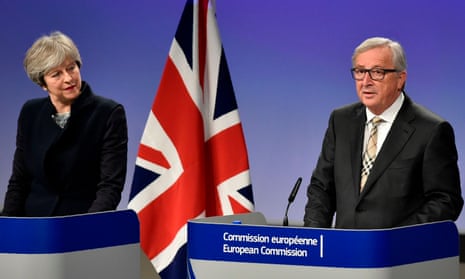The European commission president has warned Theresa May that Brussels urgently needs her “broad suggestions” on the UK’s post-Brexit relationship with the EU to be turned into workable solutions.
Jean-Claude Juncker used a speech in the European parliament to appeal for May’s “wishes”, sketched out in her Mansion House speech on 2 March, to be turned into an achievable blueprint and reiterated that the EU will stand by its “backstop” plan to keep Northern Ireland under EU law to avoid a hard border with the Irish Republic.
The danger, Juncker claimed, was that the prime minister’s goal of an “enduring” Brexit agreement would not be met, and the UK would be locked in constant and destabilising negotiations with Brussels for many years to come.
His warning came as a leaked copy of the latest draft of the withdrawal agreement, including the provisions on Northern Ireland, revealed no weakening of the EU position.
The new text now includes a reassurance to the UK that Brussels will not seek to damage British economic interests during the transition period.
But, if anything, there is a tightening of the language in other areas, including on fisheries where the EU insists that the “relative stability keys”, which include the quota system the environment secretary, Michael Gove, has vowed to have changed in the 21 month transition, will stay in place.
Brussels wants agreement on the withdrawal text before it opens talks on the future relationship, although the EU’s chief negotiator once again poured scorn on the prime minister’s proposals in her Mansion House speech.
Speaking in the European parliament, Michel Barnier said he was “surprised” that the prime minister had expected it to accept her demands. “The four freedoms, including the freedom of movement, are indivisible,” he told MEPs in Strasbourg as they debated their vision of the post-Brexit future. “You can’t want to participate in our agencies without the legal commitment of applying the law of the union and the jurisdiction of the [European] court of justice … It is a rather surprising idea to think that the 27 member states of the EU and your parliament could accept convergence as wished by the UK at the same time opening up the possibility of divergence where there is a comparative advantage for it. It is time to face up to the hard facts.”
Juncker said that without a UK plan to avoid a hard border, the “backstop” of in effect keeping Northern Ireland in the customs union and single market had to remain.
“Prime minister May: give us some more clarity on how the UK sees its future relationship with the European Union,” Juncker said in his opening address to the MEPs. “As my good friend [the former Irish PM] John Bruton wrote in a recent article, ‘The most valuable test that Mrs May wishes to apply to a Brexit agreement is that it should be one that would endure and not require constant renegotiation’.
“I could not agree more. Which means everything that we say and that we do on both sides will require the utmost clarity to pass the test.”
Juncker added: “As the clock comes down with one year to go it is now time to translate speeches into treaties, to turn commitments into agreements, broad suggestions and wishes on a future relationship into specific, workable solutions.”
In the EU’s draft withdrawal agreement, first published in February, the three options for avoiding a hard border between Northern Ireland and the Irish Republic were: a comprehensive trade deal; a bespoke, most likely technological, solution; or “full regulatory alignment” between the two territories.
Juncker said he was prepared to work on the first two solutions but that “we need to receive concrete proposals from the United Kingdom first”.
The UK had no need to be shocked, he said, that Brussels was holding the British government to its commitments made in a joint report with the commission last December to otherwise keep Northern Ireland in lock-step with EU law, as the status quo would not last beyond Brexit day on 29 March 2019.
To heckling from Ukip MEPs, Juncker added: “Then the time will come when you regret your decision.”
However, the former Luxembourg prime minister received applause from others as he added: “The 27 member states stand firm and united when it comes to Ireland. For us this is not an Irish issue, it is a European issue. It is all for one, one for all. That is what it means to be part of this union.”
Juncker added: “Anyone who leaves the EU has to know frankly what this means. If you decided to jettison, leave behind, the common agreements and rules then you have to accept that things cannot remain what they are …
“The UK is interested in having a close partnership with the EU. We have to guarantee the integrity of the single market because citizens and companies have to be able to count on the same kind of rules for citizens and companies and cherry-picking is not going to be possible.”
